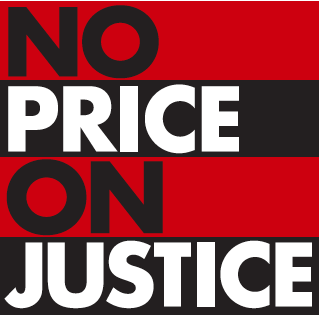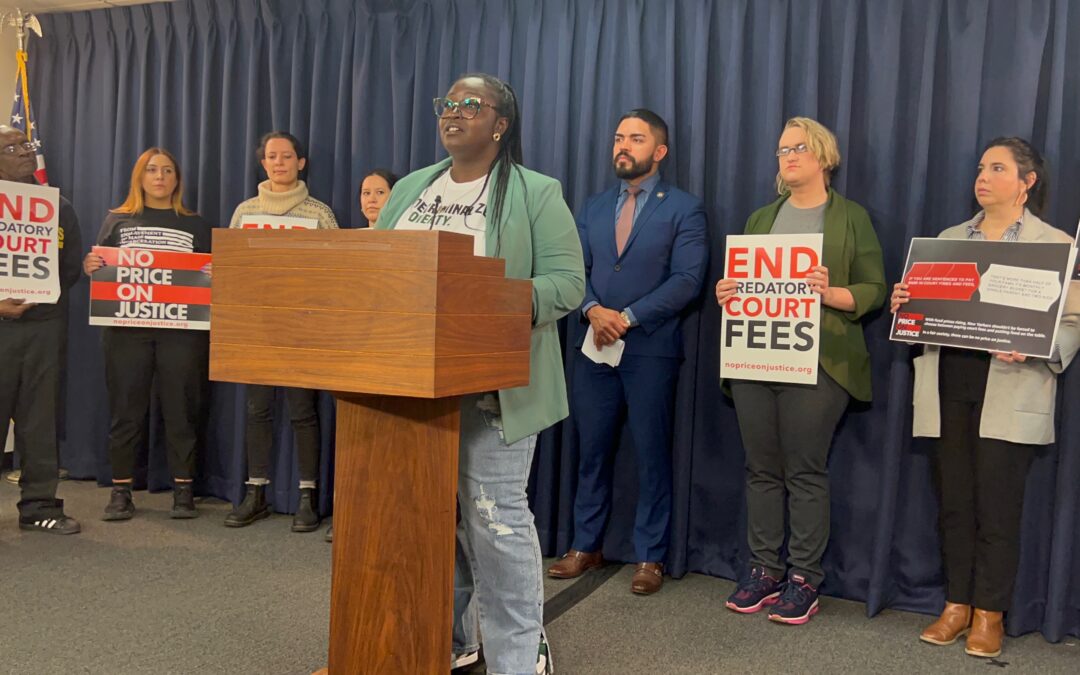FOR IMMEDIATE RELEASE
March 16, 2023
Contact: Katie Schaffer, kschaffer@communityalternatives.org, 646-265-2044
AT STATE CAPITOL, LAWMAKERS & ADVOCATES CALL FOR PASSAGE OF THE END PREDATORY COURT FEES ACT
In recognition of Women’s History Month, group details the disproportionate impact on mothers and grandmothers
ALBANY, NY – This morning, a coalition of legislators and advocates rallied at the New York State Capitol to call for the passage of the End Predatory Court Fees Act, legislation which would eliminate New York’s court fees, mandatory minimum fines, incarceration on the basis of unpaid fines and fees, and garnishment of commissary accounts.
The mandatory surcharge is a fee attached to every conviction in New York — including minor violations. Courts cannot waive or reduce these fees or surcharges — or even consider your ability to pay them. Depending on the type of conviction, a single mandatory surcharge can amount to hundreds of dollars.
People who can’t afford fees are subjected to punishments that trap them in a cycle of poverty and criminalization: incarceration, prolonged or indefinite supervision, and additional fees — with communities of color and low-income communities suffering the most.
Families are faced with the impossible choice between paying for basic necessities and court debt. These financial burdens disproportionately fall to women in the family who also had children living at home. A recent study found that almost half of the family members primarily responsible for paying court-related costs were mothers, and one in ten were grandmothers.
As lawmakers debate the State Budget, speakers demanded an end to New York’s dangerous reliance on court fees — a regressive form of taxation that traps millions of low-income residents in a vicious cycle of debt and punishment.
“Court fees are an abusive practice that harms low-income families and Black and Brown New Yorkers,” said Assembly Member Kenny Burgos, Assembly sponsor of the End Predatory Court Fees Act. “It especially affects women, and women of color in particular, as statistics show that women are more likely to face economic hardships than men, and women of color are more likely to be responsible for incarceration and court-related costs. Court fees are a regressive tax that traps low-income New Yorkers in an unending cycle of debt, causing further financial distress and fear of incarceration just for being poor. As the new Assembly sponsor of the End Predatory Court Fees Act, I am determined to finally end the criminalization of poverty and pass this bill this session.”
“The people paying predatory court fees are people like me,” said Assembly Member Chantel Jackson. “When I was 18 years old with a baby daughter, I was forced to decide whether to buy pampers or send money to my incarcerated loved one. We must pass the End Predatory Court Fees Act.”
“I know how much these predatory court fines and fees really cost. My freedom had a dollar amount, and I paid for it,” said Anthony Bibbs, member of Center for Community Alternatives. “During the week, I worked as a landscaper and tried to keep rebuilding my life. But because I couldn’t afford my fines and fees, I spent over 576 hours in jail over the course of 12 weekends. When you do the math against my $1,500 court debt, that means that to New York State, my freedom was worth a little over $2.50 an hour. We need to pass the End Predatory Court Fines and Fees act because too many Black and brown people like me are being criminalized because we can’t afford these court fines and fees.”
“Every year, New York State imposes millions of dollars in fees, fines and court surcharges on defendants, which amounts to a regressive tax on Black and brown people – in most cases the demographic least able to pay,” said Assemblywoman Latrice Walker. “I am a co-sponsor of the End Predatory Court Fees Act, because I firmly believe that justice should not come with a price tag. But in New York State, we have fees that are attached to every conviction, including traffic tickets and minor infractions. This has to stop.”
“In our court system, we penalize poverty by imposing fees and surcharges on New Yorkers, especially those who can least afford them, and that is a far cry from justice,“ said Assemblymember Linda B. Rosenthal, Chair of the Assembly Committee on Housing. “For decades, Black and Brown communities have experienced the brutal realities and consequences of over policing, and as a result, have been forced to pay millions of dollars in predatory court fees. Saddling low-income New Yorkers with a collection of surcharges is nothing more than a regressive tax that bleeds vulnerable communities of much-needed resources. It is imperative that we, as a State, balance the scales of justice for all New Yorkers, and I will continue advocating alongside my colleagues in the Assembly to ban these unjust and unconscionable fees.”
“We live in a state blessed with great wealth, though we’ve made the choice to target those who are most financially insecure as a source of additional revenue,” said Assembly Member Tony Simone. “Letting billionaires and corporations continue to amass great wealth, while we nickel and dime the working poor, is unjust and against the values we hold as New Yorkers.”
New York courts issue thousands of civil judgments and warrants every year, and may even order immediate incarceration for failure to pay. Once again, it is women who disproportionately bear the brunt of these costs. In 63% of cases, family members on the outside were primarily responsible for court-related costs associated with conviction. Of the family members primarily responsible for these costs, 83% were women.
“We have created a two tier justice system,” said Antonya Jeffrey, New York State Director at the Fees and Fines Justice Center. “One that offers a way out if you can pay up and the other that traps you in an unending cycle that impacts not only the individual but their families as well. A state’s budget is a reflection of its values. We have the opportunity to lead the nation in fee elimination and we should do it on behalf of New York families.”
“New York imposes millions of dollars per year in fees on people and families who can least afford to pay. This regressive tax punishes poverty, encourages policing for profit, and funds government services on the backs of the poorest New Yorkers, particularly Black and Brown residents,” said Zachary Ahmad, Policy Counsel at the New York Civil Liberties Union. “Government revenue should not be extracted from New York’s poorest residents, and our courts must not function as debt collectors. State lawmakers must pass the End Predatory Court Fees Act without delay.”
“As public defenders, we’ve seen how predatory court fees punish low-income New Yorkers who are already struggling to get by,” said Aleksandra Ciric and Paula Garcia-Salazar, staff attorneys in the Special Litigation Unit at The Legal Aid Society. “In the most extreme cases, our clients have even been incarcerated for failure to pay court fees. It is shocking that debtors’ prison still exists in New York, but lawmakers have the ability to finally abolish it by passing the End Predatory Court Fees Act.”
The only reason fees exist is to generate revenue for courts and other government services. New York’s mandatory surcharge was first implemented in the 1980s. Since then, it has been consistently increased without any regard for impact or accountability, failing to provide any records on how the State assesses, collects and distributes this revenue.
Local governments that choose this revenue source waste money, time, and resources. Research shows that some jurisdictions spend more tax dollars attempting to collect fines and fees than they actually receive. At a budget hearing earlier this year Assemblymember Kenny Burgos asked NY’s Chief Administrative Judge of the Courts, Tamiko Amaker, whether courts spend more money on collection efforts than they receive. Amaker was unable to answer that question.
###
About the NO PRICE ON JUSTICE campaign:
No Price on Justice is a coalition of economic and racial justice organizations, grassroots groups, and impacted people working to end New York’s predatory court fines and fees.
Members of the No Price on Justice coalition include: Brooklyn Defender Services, Center for Community Alternatives, Citizen Action, Children’s Defense Fund, Color of Change, Community Service Society, Fiscal Policy Institute, Fines and Fees Justice Center, Legal Aid Society, New York Civil Liberties Union, New York Communities for Change, Partnership for the Public Good, and a dozen other organizations from across New York State.
###


Recent Comments